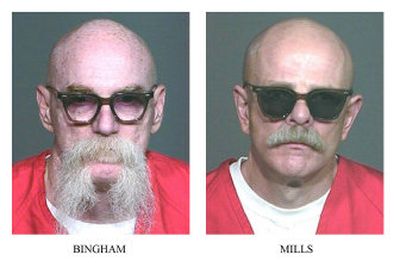Aryan Brotherhood leaders convicted

SANTA ANA, Calif. – A jury convicted four leaders of a white-supremacist prison gang Friday on charges they used murder and intimidation to protect their drug-dealing operations behind bars.
The trial is part of what is believed to be one of the largest federal capital cases, with more than a dozen people potentially facing the death penalty.
Barry “The Baron” Mills, Tyler “The Hulk” Bingham, Edgar “The Snail” Hevle and Christopher Overton Gibson were the first defendants to stand trial in the federal racketeering case aimed at dismantling the Aryan Brotherhood.
They all were convicted under Racketeer Influenced and Corrupt Organizations law, and offenses known as Violent Crime In Aid of Racketeering. Mills and Bingham are eligible for the death penalty.
Mills, Bingham and Hevle also were convicted of a murder count for the killing of Arva Lee Ray, a prisoner slain at the Lompoc, Calif., penitentiary in 1989.
Mills and Bingham were acquitted of a murder count in the death of another inmate, William McKinney.
The death penalty phase against Mills and Bingham was scheduled to begin Aug. 15 with the same jury. Sentencing for Hevle and Gibson was set for Oct. 23. They face 20 years to life in prison.
“We’re disappointed and now we move on to the next phase,” said Mark Fleming, Mills’ lawyer.
Hevle’s attorney, Bernard Rosen, said he was “shocked.” He said there was little evidence against his client.
The defendants were charged in an indictment detailing 32 murders and attempted murders involving members of the Aryan Brotherhood over three decades.
Since its founding in 1964 at San Quentin in California, the Aryan Brotherhood has infiltrated nearly every federal and state prison and devised a number of means for members to stay in touch.
In the current case, government witnesses testified about a secret note, written in invisible ink made from urine, that was passed from Bingham’s high-security cell in Florence, Colo., to Lewisburg, Pa., where the race war occurred.
Prosecutors argued it was an order to incite a race war at the Pennsylvania facility. Defense attorneys said the note was merely a warning to other gang members.